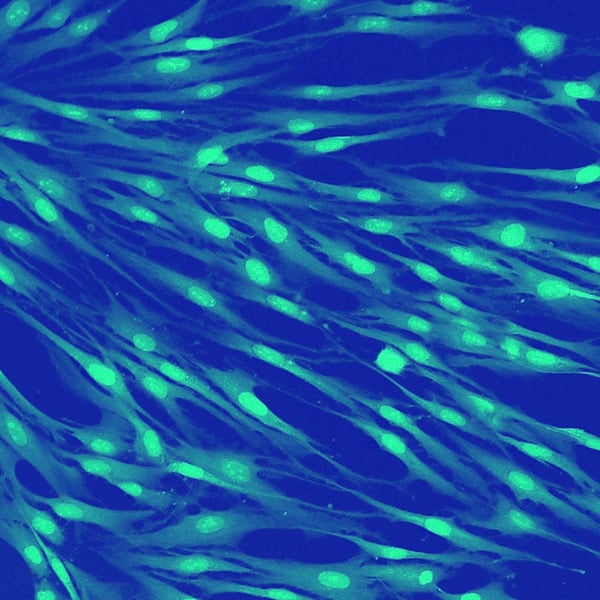CRISPR-edited Immortalized Knockout Cells
EditCo's Immortalized Cells offer robust and reproducible models for gene function studies, drug development, and therapeutic research. Delivering consistent performance and reliability, these cells accelerate scientific discovery by democratizing access to high-quality engineered cell lines.
Reliable, Reproducible Models for Accelerated Research
-
Invest in Results: Spend your time running experiments, not generating your CRISPR knockouts. Our cost-effective platform helps you maximize your research budget.
-
Exceptional Quality: Robust CRISPR automation platform optimized for superior performance and scalability.
-
Assay with Confidence: Trust your downstream assay results with EditCo's incredibly high knockout efficiencies.

Accelerate Your Research with EditCo’s Knockout CRISPR Cell Lines
Creating genetically modified CRISPR knockout cells traditionally takes months and involves a high risk of failure. Our Benchmark survey reveals that researchers invest an average of 61 hours in hands-on work before even isolating a clone, with 19.1 hours spent on optimization and 13.7 hours on transfection.
EditCo's advanced automated optimization and transfection processes eliminate these time-consuming steps, enabling you to reclaim precious research hours. Transform your research workflow with EditCo’s knockout cells and focus on achieving groundbreaking discoveries faster.
EditCo’s Automated Immortalized Cell Line Editing Process
200 Ways We Optimize CRISPR to Achieve High Editing Across Cell Lines
EditCo’s 200-point optimization has been performed in over 100 human cell lines across 15 tissue types to identify the best parameters that yield the highest editing efficiency for each cell line.
Our gene editing workflow includes the use of our unique XDel Technology or single-guide transfection, genotyping, and sequencing analysis. Choose from either EditCo supplied cell lines banked from our high-quality cell supplier ATCC, or onboard your cells.
XDel Knockout Cell Pools and Clones
High-Performance Knockout Cells for Breakthrough Discoveries
XDel is a cutting-edge CRISPR knockout technology designed to remove the guesswork from gene editing. By leveraging an innovative guide RNA design strategy, XDel delivers highly efficient, consistent, and reproducible gene knockouts—empowering researchers to accelerate their discoveries with confidence.
Whether you're conducting gene function studies, disease modeling, or drug development, XDel ensures robust results that drive meaningful insights.
- High Efficiency: Achieve superior on-target editing rates and consistent knockout performance
- Reliable Results: Experience persistent protein depletion, validated through functional assays
- Reproducibility: Minimize variability for dependable outcomes across experiments in any loss-of-function study
Features
Cell Source
- EditCo supplied
- Customer supplied
Available Edits
- Single knockout
- Homozygous (Standard)
- Cell pools and clones
CRISPR Design
- sgRNA (standard)
- XDel Technology using multi-guide synthetic modified
Add-Ons
- Additional clones
- Additional vials
- Intermediate pools
Deliverables
- Regular updates on your order's progress
- 2 cell pools or 2 independent clones with the required knockout (2 vials of each clone with 5x10⁵ cells/vial)
- Control-transfected cell pools (2 vials)
- Sequence of synthetic sgRNA used
- Primer sequences used for NGS sequencing
- NGS sequencing analysis report for each edited pool after expansion.
- Comprehensive QC report that includes mycoplasma test (positive/negative) and passage number
XDel delivers higher and more consistent on-target editing compared to single-guide, ensuring superior editing performance
While traditional single-guide knockouts demonstrate a wide and often unpredictable range of on-target editing efficiencies, EditCo XDel technology stands out for its consistent high performance. XDel ensures reliable outcomes across many different cell lines, often outperforming single-guide in both efficiency and reproducibility.

Figure 1. XDel multiple gRNA on-target editing efficiency is significantly higher and more consistent compared to single-guide RNA methods. On-target editing efficiency of multi-guide (pink bars) vs their 3 respective single-guide RNAs (blue bars) across 7 endogenous target loci transfected in two immortalized (IMM) and two iPSC cell lines indicates that XDel technology delivers significantly higher and more consistent on-target editing efficiency compared to single-guide. Each transfection was performed in triplicate and data were analyzed via NGS by EditCo’s proprietary software analysis.
XDel technology maximizes on-target gene editing while minimizing off-target effects compared to single-guide editing
Unlike single-guide RNA strategies, which show variable editing efficiencies across different doses, EditCo’s XDel technology consistently achieves high on-target editing efficiency - even at low does concentrations. This reproducibility highlights the robustness of XDel technology which delivers reliable results independent of dose or position effects as seen by the single-guide approach. XDel gRNA design ensures superior and reproducible editing performance, allow you to focus on your research without the need for additional optimization.

Figure 2. XDel multiple guide RNA off-target editing efficiency is significantly lower compared to single guide RNA methods. Off-target editing efficiency of XDel cells (pink bars) at all 3 of their respective single-guide off-target sites vs their 3 respective single-guide RNAs (blue bars) across 63 off-target loci (3 off-target loci per 7 on-target site tested) transfected in two immortalized (IMM) and two iPSC cell lines indicates that XDel cells deliver significantly lower off-target editing efficiency compared to single-guide. Each transfection was performed in triplicate and data were analyzed via NGS by EditCo's proprietary software analysis.
 Figure 3. XDel multiple guide RNA editing efficiency remains high as gRNA concentration is decreased compared to single guide RNA methods. Average on-target (pink bars, multi-guide; blue bars, single-guide) editing efficiency in transfected HEK293 cells with multi-guide (left) vs single-guide (right) and SpCas9 at increasing RNP concentrations (0.25X, 1X, 4X) at 7 endogenous sites vs off-target editing efficiency (stacked grey bars) at 63 off-target sites indicates that XDel cells maintain high on-target editing efficiency with minimal off-target effects compared to single-guide. Each transfection was performed in triplicate and data were analyzed via NGS by EditCo's proprietary software analysis.
Figure 3. XDel multiple guide RNA editing efficiency remains high as gRNA concentration is decreased compared to single guide RNA methods. Average on-target (pink bars, multi-guide; blue bars, single-guide) editing efficiency in transfected HEK293 cells with multi-guide (left) vs single-guide (right) and SpCas9 at increasing RNP concentrations (0.25X, 1X, 4X) at 7 endogenous sites vs off-target editing efficiency (stacked grey bars) at 63 off-target sites indicates that XDel cells maintain high on-target editing efficiency with minimal off-target effects compared to single-guide. Each transfection was performed in triplicate and data were analyzed via NGS by EditCo's proprietary software analysis.
XDel Cell Pools Demonstrate Sustained Gene Knockout Across Multiple Cell Passages
Figure 4. High editing efficiency is sustained through multiple cell passages. Using EditCo’s multi-guide designs, up to 3 modified gRNA per target (across 6 genes) were conjugated with SpCas9, and RNPs were transfected into U2OS cells. Editing efficiencies were measured at different time points post-transfection and up to 4 passages. The median editing efficiency is >85 percent for each of the targets.
Cell Viability Is Maintained Across Passages with XDel
Figure 5. Cell viability is maintained through multiple cell passages in U2OS cells. Viability was taken using Celigo. Please note that CDK9 is a common essential gene, hence the lower viability and cell number observed along the passages.
XDel knockout cell pools show persistent protein depletion, enabling their direct and reliable use in functional assays
Figure 6. Edited cell pools utilizing the multi-guide technology shows persistent protein depletion. This enables direct and reliable use of these cell pools for functional assays. Western blot analyses for all 5 knockout target genes indicate a complete depletion of proteins across the 3 specified time points (days 7, 14, and 21) relative to the negative controls. Knockout cell pools for the target genes were generated by nucleofecting U2OS cells with multi-guide sgRNA and Cas9 (as RNPs). A negative control pool was also transfected for each target using non-targeting sgRNA.
How does the XDel strategy work?
Traditional CRISPR knockout methods often depend on a single guide RNA that, in tandem with SpCas9, generates assorted insertions or deletions (indels) at the target cut site. This approach can be unpredictable, leading to variable edits and incomplete knockouts.
EditCo’s smart informatics generates a multi-guide design which is composed of up to 3 sgRNAs targeting a single gene of interest. The guides are spatially coordinated and work cooperative to induce a guided repair that results in fragment deletion in an early exon, making it the most reliable knockout strategy compared to other pooled strategies.
Figure 7. XDel design includes up to 3 modified sgRNAs (purple bars) that target a single gene of interest. When co-transfected, the sgRNAs create concurrent double-stranded breaks at the targeted genomic locus and consequently induce one or more 21+ bp fragment deletions.
Single-guide RNA Knockout Cell Pools & Clones
Accelerate Your Discoveries with Tailored CRISPR Knockout Cells
EditCo’s Knockout Immortalized Cell Pools and Clones provide reliable and efficient CRISPR solutions to accelerate your research, offering targeted gene disruption using advanced single-guide RNA technology for precise and impactful results.
Pools of cells consist of a heterogeneous population of edited and unedited cells for your gene of interest, whereas clones refers to a single, genetically uniform population of cells derived from a parent cell.
Our cell pools achieve over 50% knockout efficiency, providing a ready-to-use mix of edited and unedited cells for immediate assay validation or clonal isolation, while our sequence-verified clonal populations deliver precise gene knockouts through a streamlined, fully optimized CRISPR-Cas9 process. With EditCo, you can focus on discoveries while we handle the complexities of CRISPR editing, offering both pools and clones to meet your research needs.
Features
Cell Source
- EditCo supplied (standard)
- Customer supplied
Available Edits
- Indel (standard) or fragment deletion
- Single, double, or triple knockout
CRISPR Design
- Synthetic modified sgRNA (standard)
Add-Ons
- Additional clones
- Additional vials
- Additional pools
Deliverables
- Regular updates on your order's progress
- Edited cell pools (2 vials with 5x10⁵ cells/vial)
- Control-transfected cell pools (2 vials)
- Sequence of synthetic sgRNA used
- Primer sequences used for NGS sequencing
- NGS sequencing analysis report for each edited pool after expansion.
- Comprehensive QC report that includes the following information: mycoplasma test (positive/negative), passage number, and analysis for add-on QC
Sequencing deliverable note: For large fragment deletions and non-human/mouse cell types, an alignment between the Sanger sequencing data of the edited clone and the reference will be provided
Efficient Generation of Knockout Clones with Functional Outcomes
EditCo’s CRISPR Knockout Cell Clones eliminate the time and hassle of doing CRISPR editing and creating clonal cell lines so you can focus on your research.
Validate your Assays with up to 95% Protein Knockout
EditCo’s Knockout Cell Pool gives you the protein knockout you need in the cell line you want, enabling you to either assay pools directly or quickly move to isolate single cell clones.
Figure 6. EditCo’s Knockout Cell Pool achieved 95 percent protein knockout without clonal expansion. A cell pool with a surface protein knocked out was generated in U2OS cells with a Knockout Score of 87 percent (left panel, which is the percentage of indels that either introduce a frameshift mutation or are larger than 21 nucleotides, analyzed by ICE). Levels of this protein were analyzed by flow cytometry (blue) and were reduced by 95 percent relative to wild type (green, right panel). Negative control samples were stained with an isotype control antibody (purple). Data provided by Eurofins-DiscoverX.
Knockout Cell Libraries
Everything you need to get screening with Speed and Confidence
EditCo’s Engineered Cell Libraries simplify high-throughput CRISPR screening for functional assays, overcoming traditional barriers like infrastructure limitations and transfection challenges.
These custom panels of knockout immortalized pools, designed using advanced multi-guide technology, achieve editing efficiencies over 90% and are provided in a ready-to-use 96-well arrayed format. With streamlined workflows, comprehensive QC reports, and compatibility with diverse downstream assays, our libraries empower you to confidently discover and validate drug targets at scale—letting you focus on your assay while we handle the CRISPR complexities.
Learn more about our Knockout iPSCs, also available as cell libraries.
The Engineered Cell Libraries workflow includes multi-guide design, high-throughput transfection, knockout pool generation, genotyping, and sequencing analysis.
Features
Cell Source
- EditCo supplied
- Customer supplied
Available Edits
- Single knockout cell pools
CRISPR Design
- Multi-guide synthetic modified sgRNA (standard)
Deliverables
- Regular updates on your order's progress
- User-specified knockout cell pools per library (2 vials of each pool with ~20,000 cells/tube, 20 minimum order)
- 5 control pools per rack: 2 mock WT, 2 multi-guide KO, 1 single-guide KO
- Sequence of synthetic sgRNA used
- Primer sequences used for PCR and Sanger Sequencing
- ICE Sanger sequencing analysis reports
- Comprehensive QC report that includes mycoplasma test (positive/negative) and passage number
Engineered Cell Libraries Demonstrate High Editing Efficiencies Across Cell Types
Engineered Cell Libraries provide a set of CRISPR-edited cell pools that can be used directly in functional assays for a wide array of different screening and discovery applications. Editing efficiencies for each pool are assessed by sequencing and ICE analysis to inform the interpretation of assay results.
Knockouts in Human Immortalized Cell Line
Figure 1. A library of knockout cell pools corresponding to 42 gene targets was generated via high-throughput editing in human cells. Data from the experiment are shown above. An Engineered Cell Library with 42 gene targets was generated via high-throughput editing of an immortalized-adherent human cell line, A375, using multi-guide technology. The data demonstrate both indel frequencies and Knockout Scores. Of the 84 percent of pools successfully sequenced and analyzed, an average indel frequency of 99 percent and an average Knockout Score of 98 percent were observed.
Knockouts in Mouse Immortalized Cell Line
Figure 2. A library of knockout cell pools corresponding to 192 gene targets was generated via high-throughput editing in mouse cells. The data demonstrate both indel frequencies and Knockout Scores. Among the 80 percent of pools successfully analyzed, the average indel frequency was 89 percent, while the average Knockout Score was 84 percent.
Our Unique Guide Design Powers Functional Knockouts and Sustained Protein Depletion
The multi-guide approach consists of up to 3 gRNAs (purple bars) spatially coordinated that target a single early exon of a gene and induce multiple concurrent double-strand breaks in the target sequence. This results in disruptive one or more >21 bp fragment deletions. This approach is associated with higher frequencies of knockout alleles in edited pools but reduced occurrence of off-target edits as compared to single-guide approaches.
Figure 3. The multi-guide approach consists of 3 gRNAs spatially coordinated to create a fragment deletion in a single exon. Targeting a single early exon of a gene induces multiple concurrent double-strand breaks in the target sequence of a gene. This results in disruptive one or more >21 bp fragment deletions. This approach is associated with higher frequencies of knockout alleles in edited pools but reduced occurrence of off-target edits as compared to single-guide approaches.
 Figure 4. Edited cell pools utilizing the multi-guide technology shows persistent protein depletion. This enables direct and reliable use of these cell pools for functional assays. Western blot analyses for all 5 knockout target genes indicate a complete depletion of proteins across the 3 specified time points (days 7, 14, and 21) relative to the negative controls. Knockout cell pools for the target genes were generated by nucleofecting U2OS cells with multi-guide gRNA and Cas9 (as RNPs). A negative control pool was also transfected for each target using non-targeting gRNA.
Figure 4. Edited cell pools utilizing the multi-guide technology shows persistent protein depletion. This enables direct and reliable use of these cell pools for functional assays. Western blot analyses for all 5 knockout target genes indicate a complete depletion of proteins across the 3 specified time points (days 7, 14, and 21) relative to the negative controls. Knockout cell pools for the target genes were generated by nucleofecting U2OS cells with multi-guide gRNA and Cas9 (as RNPs). A negative control pool was also transfected for each target using non-targeting gRNA.
Testimonial
Simon Lebaron
PhD-HDR, CRCN INSERM. Université de Toulouse (CBI, MCD Unit), France.
"As a researcher studying the newly characterized factor SURF2 and its role in cancer resistance to chemotherapies, we aimed to investigate the effects of its depletion on cell proliferation and phenotypic traits using U2OS and HepG2 cell lines. While siRNA strategies initially yielded promising results, we sought a more robust and long-term solution to avoid potential biases caused by transfection-induced stress responses.
Lacking the time and expertise to develop a CRISPR strategy within our team, we turned to Editco for assistance in generating knockout pools for these cell lines. Within a remarkably short time, we received pools with 100% homozygous deletions. After verifying the results ourselves, we were impressed by the efficiency and quality, even isolating clones to further refine our analyses.
This allowed us to rapidly assess the impact of SURF2 knockout on key cellular parameters, culminating in the publication of our findings in Nature Communications (Tagnères et al.). These cell lines continue to play a pivotal role in advancing our research on SURF2, and we wouldn’t hesitate to collaborate with Editco again for future CRISPR projects. Their expertise and efficiency have been invaluable to our work."
Read more in the Nature Communications paper

Resources
Integrating our core CRISPR expertise, high-quality reagents, and automated processes, we deliver the best edited cell-based models at any scale.

Use cases diam faucibus donec pretium leo risus commodo sit. Phasellus a sit.



Quisque amet eu viverra aliquam sed. Montes nulla nisi sit vel urna leo. Nisi donec consectetur bibendum tortor. Gravida arcu lorem venenatis nulla sodales quis sed.
Testimonials consectitur amet sed
Congue fermentum eros leo commodo. Integer vitae vitae ac amet. Vitae sed lectus vel lacus adipiscing nulla facilisis mauris porttitor. Viverra elementum odio vitae id.

Viverra aliquam volutpat interdum quisque vel mattis. Malesuada aliquam egestas pharetra a tempus ullamcorper egestas.

Nibh luctus pulvinar sagittis faucibus commodo vitae purus. Ullamcorper dictum.

Congue fermentum eros leo commodo. Integer vitae vitae ac amet. Vitae sed lectus vel lacus adipiscing nulla facilisis mauris porttitor. Viverra elementum odio vitae id.

Congue fermentum eros leo commodo. Integer vitae vitae ac amet. Vitae sed lectus vel lacus adipiscing nulla facilisis mauris porttitor. Viverra elementum odio vitae id.

Congue fermentum eros leo commodo. Integer vitae vitae ac amet. Vitae sed lectus vel lacus adipiscing nulla facilisis mauris porttitor. Viverra elementum odio vitae id.

Lectus Pluristyx eu vel leo lectus mi. Viverra cursus neque eget proin.
Pellentesque nec tempus ultrices purus amet adipiscing aliquam. Posuere imperdiet adipiscing non blandit non. Sed eros vel sodales magna sem tincidunt orci risus. Molestie hendrerit cursus faucibus ac neque eget turpis. Arcu leo risus iaculis mi. Tortor bibendum sed cras pretium leo.
0+
0+
0+
Lorem Ipsum Dolor Heading
Etiam sollicitudin, ipsum eu pulvinar rutrum, tellus ipsum laoreet sapien, quis venenatis ante odio sit amet eros. Duis arcu tortor, suscipit eget, imperdiet nec, imperdiet iaculis, ipsum. Maecenas nec odio et ante tincidunt tempus. Donec elit libero, sodales nec, volutpat a, suscipit non, turpis. Quisque id mi.
Resources aliquam procte











